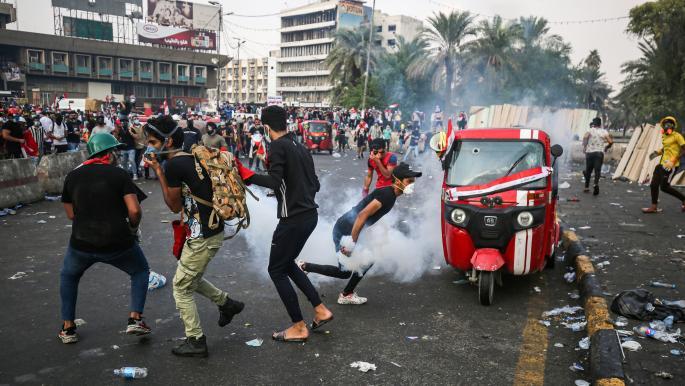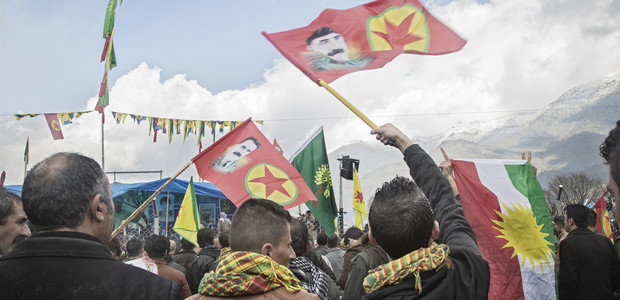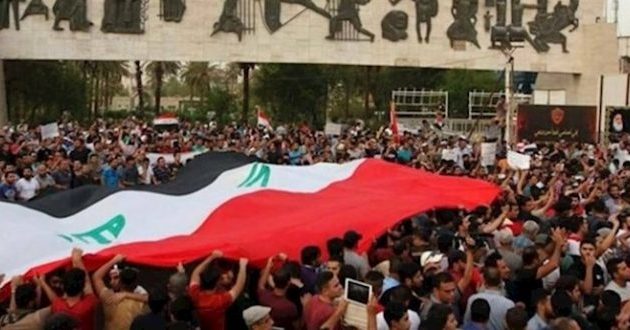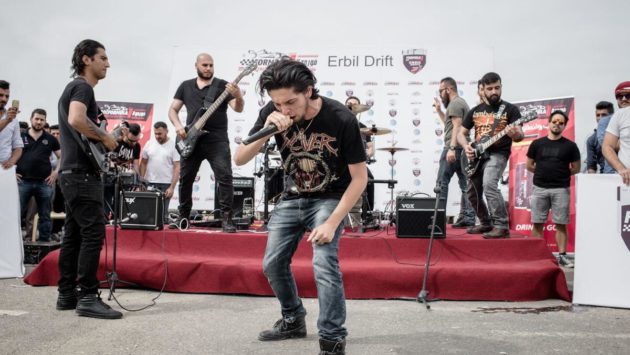Police Officers Detained on Accusations of Violently Suppressing Demonstrators — What about Militias?
Baghdad
Anthem Saif al-deen
On Thursday, the judicial authority in Iraq announced that it has detained a number of police officers and members of the security services on charges of suppressing the demonstrations. It has also issued court rulings against some officers accused of using excessive force on demonstrators. Activists however are questioning the role of various non-governmental armed factions involved in the violence, and are concerned that the judiciary might fail to hold these extra-governmental militias responsible for the crimes they committed.
The Iraqi demonstrations, which spread to most provinces starting in October of last year, forced the government of Adel Abdul Mahdi to resign. Activists endured terrible acts of violence, including the use of live bullets by security personnel, as well as raids on public squares where protestors gathered to demonstrate peacefully. Activists were not only attacked by elements within the Iraqi government, some were assassinated by members of armed militias, acting outside of governmental control. Unofficial reports suggest that more than 700 demonstrators have been killed and more than 22,000 injured.
According to a statement issued by the Media Center of the Supreme Judicial Council, “The council’s president, Fayeq Zaidan, convened the National Security Adviser, Qassem al-Araji, the head of the National Security Service, Abdul-Ghani al-Asadi, and the head of the Anti-Terrorism Service, Lieutenant General Abd al-Wahhab al-Saadi in order to discuss putting into place the appropriate judicial procedures needed to deal with the incidents of killing and wounding demonstrators and members of the security forces.”
The statement continued,”The President of the Council confirmed that the investigative bodies concerned with these cases issued a number of arrest warrants against some employees of the Ministries of Defense and Interior, but under the Military Notices Law and the Internal Security Forces Notifications Law, the approval of the Commander-in-Chief of the Armed Forces and the Minister of Interior must be obtained if these warrants are in fact to be implemented”. It also pointed out that “the Judicial Investigation Commission in Rusafa summoned both the former Minister of Defense and the Interior to inquire about information related to the investigation of these cases.”
The report stressed that “there are a number of officers already arrested whose cases are pending, awaiting proper investigation, while other officers have been sentenced by the relevant courts, and are now subject to scrutiny by the Court of Cassation.”
A government official confirmed that Prime Minister Mustafa Al-Kadhemi is closely following the progress of the investigations into the violence that accompanied the demonstrations, and that he would announce their results publicly as soon as decisions have been made.
One official told The New Arab newspaper that “Al-Kadhemi has assigned security officials, including Al-Araji, Al-Asadi, Al-Saadi and others, to follow up on the investigations with the judicial authority, and that he would be first to be informed of all progress made,” indicating that “the investigation is being conducted in a professional manner, and that no party can interfere with the work of the judicial authority.”
The judicial authority’s reports of detaining officers and issuing sentences has raised concerns for some activists who emphasized that the Iraqi police are not the only ones to commit violent acts against nonviolent protesters, and any and all individuals or groups involved in killing and kidnapping must be held fully responsible.
Activist Ziyad Al-Fatlawi told The New Arab that “the speech from the head of the judiciary does not reassure activists about the investigation.” He spoke about the detention and sentences of officers and associates of the security services, but he did not mention other armed factions, as if they have played no part in the violence and abuse.” Al-Fatlawi went on, “We have provided evidence, including videos, to the judicial authority which prove that these extra-governmental factions have been directly involved in the suppression, killing and kidnapping of demonstrators.”
Al-Fatlawi questioned why the judiciary seems to want to keep these factions away from the investigation. He and other activists hold the government and its head “responsible for any unprofessional methods used in this investigation,” and warned that “any protection offered to armed factions which shields them from the rule of law is akin to condoning their participation and supporting them in their aim to commit crimes with impunity.”
A member of the Iraqi Communist Party in Dhi Qar governorate in southern Iraq, Ali Al-Nasiri, commented on the statement about detaining a security officer and summoning officials, saying that this step by the government comes too late. Looking at the file on the fall of Mosul, for example, which was there for six years, one can make a comparison between the investigation into crimes committed in Mosul and those committed during the peaceful demonstrations. Both deserve attention. yet we can see that the investigations into the crimes committed in the demonstration is still of interest for the judiciary.
In an interview with The New Arab, Al-Nasiri stated that “attempts by government authorities and political forces to use the factor of time as a way to dilute the issue in hopes that the Iraqi people might forget the horrible violence that was unleashed on their fellow citizens as they protested nonviolently for their rights is delusional; the demonstrations continue in public squares around the country and may increase in size again after the end of the COVID pandemic. After all, the reasons for the protests still exist, nothing has yet changed for the better.”




